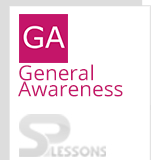 Introduction
Introduction
Polity is a very important subject for Railway Recruitment exams and UPSC Exams. SSC CPO Prelims exam is a combination of sections like General Awareness, Reasoning, Quantitative Aptitude, and English. Polity is one of the most important topics in the General Awareness section. SSC CPO Polity Quiz 10 presents the most important questions related Polity section.
 Samples
Samples
1. The Speaker of the Lok Sabha has to address his letter of resignation to
-
A. Prime Minister of India
B. President of India
C. Dy. Speaker of the Lok Sabha
D. Chairman of the Rajya Sabha
-
A. 1 and 2
B. 1 and 4
C. 2 and 3
D. 3 and 4
-
A. Originally provided by the Constitution
B. Included in the Constitution by the 44th Amendment
C. Included in the Constitution by the 42nd Amendment
D. Inserted into the Constitution by a judgement of the Supreme Court
-
A. Estimates Committee
B. Committee on Public Undertakings
C. Public Account Committee
D. Committee on Public Assurances
-
A. War
B. External Aggression
C. Armed Rebellion
D. Internal Disturbance
6. In which of the following lists of the Indian Constitution is the subject of `Population control and `family planning included?
-
A. Union List
B. Concurrent List
C. State List
D. Residuary List
-
A. The President is free to withhold his assent again
B. The Bill will automatically lapse
C. The Bill will be referred to the Supreme Court
D. The President shall not withhold his assent
-
A. Inter-State rivers
B. Trade Unions
C. Citizenship
D. Local Government
-
A. Shall not be inquired into by any court
B. Maybe inquired into by any of the High Courts
C. Shall be inquired into by the Supreme Court only
D. May be inquired into by either House of Parliament
-
A. Citizens right to an adequate means of livelihood
B. Free and Compulsory education to children under 14 years of age
C. Free legal aid
D. Prohibition of the slaughter of cows and calves
11. Which one of the following is NOT included as a Fundamental duty in the Constitution of India?
-
A. To Cherish and follow the noble ideals which inspired our national struggle
B. To develop the scientific temper humanism and the spirit of inquiry and reform
C. To protect the minorities
D. To safeguard public property and to abjure violence
-
A. Real and popular
B. Titular and de-jure
C. Political and nominal
D. Constitutional and nominal
-
A. Religion only
B. Either Religion or Language
C. Either Language or Caste
D. Either Religion or Race
-
A. B.N. Rao
B. Dr. Ambedkar
C. Dr. Rajendra Prasad
D. Sachidanand Sinha
-
A. Golaknath case in 1967
B. Sajjan Singh case in 1965
C. Shakari Prasad case in 1951
D. Keshvanand Bharati case in 1973



